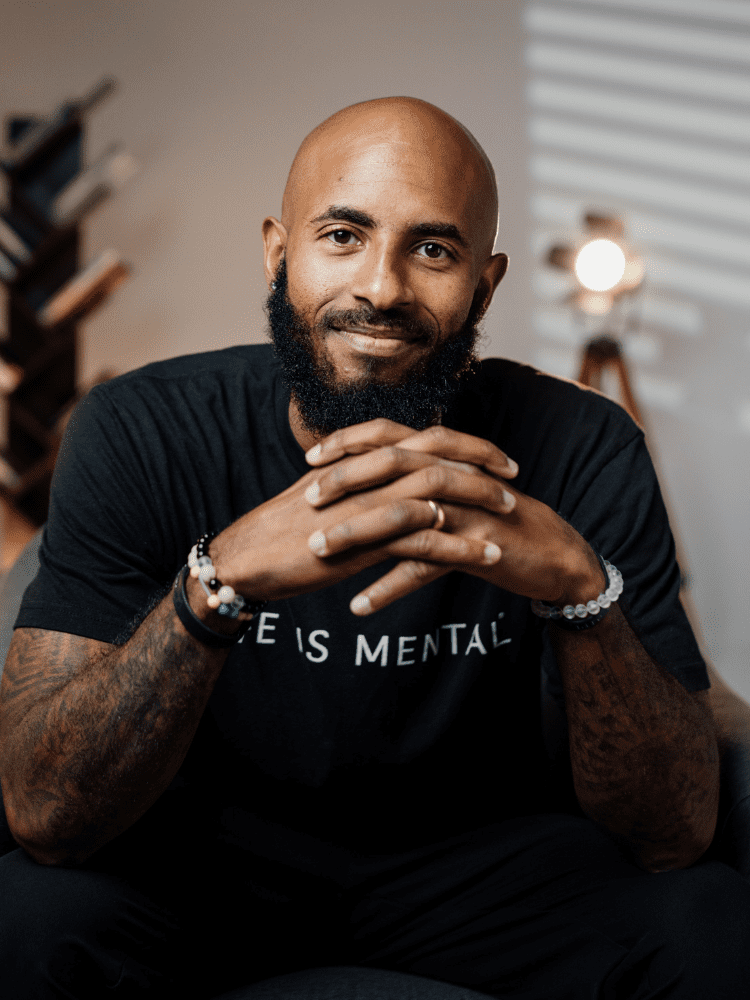Strengthen More Than Your Muscles
Your mental fitness is just as important as your physical fitness. While physical strength allows you to perform tasks and engage in activities, mental strength fuels your motivation, emotional stability, and perseverance. It can enable you to achieve your goals and overcome setbacks. Just as going to Camp and working out with Burn On Demand enhances your physical fitness, cultivating mental strength can lead to greater overall well-being and success.
Mental Strength with Derick “DG” Grant

Burn Boot Camp’s Burn On Demand category, Mental Strength, will help you create the life you want by impacting and changing your mindset. Derick Grant, also known as DG, leads this series to help you ultimately improve your quality of life. As a former professional athlete, Derick Grant was only focused on physical fitness and skill. Over time, he discovered that there is a fuel source and driver behind this – his mindset. “You will always go as far as your mindset takes you. You can be the most skilled, you can be physically fit, but if you don’t have the engine of the mind behind it, you’re only going to go so far,” Derick Grant shared. Through his own hardships, he started to learn how the mind works, fueling his passion and decision to become a transformation life coach and Trainer of the Burn On Demand series, Mental Strength.
The Six Higher Faculties of the Mind
The six higher faculties of the mind are often considered to be key aspects that enable higher-level thinking and personal development. These faculties work together to enhance our cognitive abilities and emotional intelligence, contributing to personal growth and effective problem-solving. By understanding each faculty and knowing how to use it constructively, you can improve your overall mindset and shift your perspective to help you reach your goals.
- Imagination
- Imagination enables creative thinking, allowing us to generate new ideas, envision possibilities, and think outside the box. There are two main ways that you can use your imagination. You can either use it consciously and constructively to build the future that you desire or you can use it unconsciously to create fear, stress, and anxiety. It’s one of the most powerful parts of your mind, as it’s responsible for everything that’s been created around you. Derick Grant has tips and tricks on how to use your imagination for what it was intended for in his Burn On Demand video, Faculty 1: Imagination.
- Memory
- Known as the other side of imagination, memory plays a significant role in shaping our identity and influencing our behavior. Where imagination is future-based thinking, memory is past-based thinking. Just like imagination, your memory can work as a tool or a weapon. When we use memory consciously, we experience gratitude. However, memory can also cause us to feel regret, shame, and guilt. What questions can you ask yourself to use memory consciously? Visit Faculty 2: Memory in Burn On Demand’s series, Mental Strength, to get Derick Grant’s advice on how to use memory to help strengthen your brain.
- Intuition
- Often described as a “gut feeling” or a sudden insight, intuition allows us to make quick judgments and decisions based on accumulated knowledge and experiences, even when we may not be fully aware of the underlying reasons. This can be particularly valuable in situations requiring rapid decision-making. You can develop and strengthen this mind “muscle” by practicing stillness. Taking time alone without distractions allows you to reflect and ask yourself questions that tap into your intuition.
- Reason
- Reasoning is a faculty that you use multiple times a day. It’s a problem-solving tool that allows us to think logically, analyze information, and draw conclusions based on evidence and rational thought. It is essential for decision-making, enabling us to evaluate situations, weigh options, and make informed choices. The ability to reason enhances our understanding of complex concepts and allows us to navigate the world with clarity. By trusting your intuition, you can use reason to step forward. It’s the fuel that gets you moving in the direction you need to go. Unconsciously using reason can result in overthinking or feeling stuck.
- Willpower
- Willpower is the directive force that you use to steer your thinking. It involves the ability to control impulses, make conscious choices, and persist in the face of challenges. It’s closely linked to self-discipline and self-control, which allows you to set goals and work toward achieving them. Willpower can be depleted over time, just like a muscle that gets fatigued with use. Every time you show up to the gym or workout when you don’t want to, you’re strengthening your willpower. The stronger your willpower is, the better you can steer your thinking and regulate your emotions, directly tying this faculty into your experience of life.
- Perception
- This faculty is the lens that you use to view life. It involves the process of interpreting sensory information to understand and navigate the world around us. It encompasses not just the raw data received through our senses, but also how we make sense of that data based on our experiences, beliefs, and context. The way you feel is determined by how you perceive a situation. Visit the Burn On Demand video, Faculty 6: Perception, to hear what DG has to say about how to use perception consciously and strengthen this faculty.
Putting It In Action
Mental strength fosters a growth mindset, encouraging us to view setbacks as opportunities for learning and development rather than failures. It also plays a crucial role in setting and pursuing goals, allowing us to persevere despite difficulties and distractions. Download the Burn Boot Camp app and start your free Burn On Demand trial to enjoy Mental Strength today!
You can use Burn Boot Camp’s book, BURN: The Burn Boot Camp 5-Step Strategy for Inner and Outer Strength, to learn how to learn how to use your mindset to set and achieve your goals. This book takes you through a system that teaches you how to set goals and create actionable steps to achieve them. It emphasizes the importance of setting specific, emotionally-attached “NorthStar goals” and breaking them down into manageable steps.


